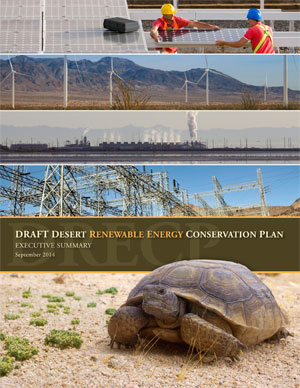(originally posted on California Current, cacurrent.com by V. John White on March 3, 2016 – link)
The California Public Utilities Commission in 2013 and 2014 authorized Southern California Edison and San Diego Gas & Electric to buy power to meet local capacity requirements to fill the gap from the retirement of once-through-cooled power plants and the San Onofre Nuclear Generating Station in Southern California.
We at the Center for Energy Efficiency & Renewable Technologies were heartened by the commission’s directives that the two utilities meet their local capacity needs by following the loading order’s preference for “preferred resources”—energy efficiency, demand response, and renewable generation—over fossil-fueled generation.
This was a first-of-its-kind directive by the commission in a Long Term Procurement Proceeding.
However, this promise of a path to a clean, low-carbon energy future has not been realized by the results of the requests for offers issued by Edison and SDG&E.
We had hoped that the decision was a clear recognition that this commission plays a fundamental role in ensuring California is on course to change the portfolio of resources that supply electricity to state consumers from one based on fossil or gas-fired generation to one employing clean, low-carbon resources.
Disappointingly, the two offer requests have resulted in more gas-fired generation being planned and built on a large scale, with a de minimis amount of preferred resources being procured.
Of the two applications that have been approved more than 75 percent of the procurement is gas-fired generation.
Both these cases are currently subject to multiple litigation challenges questioning the merits, legality, and compliance of this lopsided approval of such an excessive amount of fossil-fueled generation when the state’s goals and mandates are focused on reducing greenhouse gas emissions and increasing reliance on clean resources, including renewable generation.
Claims made by the commission that this over-reliance on gas-fired generation is required for “reliability” alone neglect the fact that it is charged with balancing the environment and costs equally with reliability needs in approving utility procurement.
Sadly, these decisions were not what CEERT anticipated.
However, those are not as disappointing and legally flawed as the pending proposed decisions before the commission on Edison’s request for offers for the Moorpark Sub-Area (A.14-11-016). The results of that offer for California’s clean energy future are the most troubling—where the so called “reliability need” has always been in question. That request for offers resulted in less than 5 percent of the procurement being from preferred resources, with no demand response. The other 95 percent is represented by gas-fired generation.
While the administrative law judge’s proposed decision and Commissioner Mike Florio’s alternate would defer the largest of the gas-fired projects pending California Energy Commission review, a more recent proposal by Commissioner Carla Peterman would approve this project. And, comments by Florio at a recent all party meeting indicate he would now support Peterman’s proposal.
The problem with these outcomes is that they ignore a significant factual and legal record developed by multiple parties, including the City of Oxnard, Sierra Club, California Environmental Justice Alliance, Center for Biological Diversity, and EnerNOC, Inc.
The record demonstrates that Edison’s request for offers process and its results for Moorpark were seriously flawed in terms of procuring preferred resources. The record shows that actions were taken by Edison after-the-fact of bidding based on private consultations with the California Independent System Operator to impose performance requirements on demand response that the commission has rejected.
Unsurprisingly, no demand response originally bid into the Moorpark offer made the cut.
In terms of the gas-fired projects approved or deferred for approval, these parties provided evidence that demonstrates the risks attendant to the natural gas-fired Puente Project, both as to its location and its impact on environmentally disadvantaged communities, undermining claims of “reliability” risks that only this plant can satisfy. In fact, the proposed decision and alternate by Florio confirm that “because Oxnard is an environmentally disadvantaged community,” the replacement of the retiring once through cooling facility with Puente simply “perpetuates the economic injustice issues connected with living near power plants built decades ago.”
The other gas-fired project (Ellwood Refurbishment) does not even meet the parameters of the underlying request for offers.
None of the proposed decisions examine why this offer request failed on the preferred resources front, or asked what changes could be made to achieve different, more environmentally beneficial results.
CEERT is concerned with these outcomes, alone and especially in combination with each other, because they are putting this state on a track away from, not toward, a low-carbon energy future.
The heart of the problem has been the unfortunate assumption by both CAISO and the commission that increasing Southern California’s reliance on conventional natural gas power plants is the only economically and technically feasible means of meeting local and system reliability. By discounting and devaluing preferred resources’ ability to help meet local reliability needs, the commission has stumbled into a trap of locking in conventional gas for years to come, with the accompanying greenhouse gas and criteria air pollutant emissions.
The Aliso Canyon disaster has underscored the reliability risk of expanding our dependence on natural gas-fired generation. It argues for a fresh look at the best ways to meet local reliability needs, and how to balance the economic, environmental justice, and greenhouse gas emissions considerations inherent in these procurement decisions.
CEERT and the Sierra Club urge deferment of decisions on the gas-fired Moorpark, Puente and Ellwood proposals.
State regulators should order Edison to issue a new request for offers that corrects the failures of its initial proposal and identifies and secures alternative, preferred resources consistent with California’s environmental justice and climate objectives.
These same gas-fired projects can bid into a subsequent request for offers. But the request must fairly consider, clean, low carbon resource alternatives that do not burden either the environment or polluted and economically disadvantaged communities.


